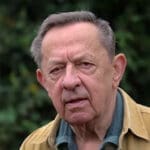Inspired by the interviews in the Paris Review and Bomb magazine, “The Questions” in Sports Illustrated, and the regular interviews on the blogs of Tom Peters and Guy Kawasaki, Comment has asked a diverse group of mentors for their stories.
Comment: How would you explain what you do to an interested nine-year-old child?
Calvin Seerveld: I read books to find out what has been happening in the world God made. Many books tell stories and show pictures or have music. I like those books best because they help me see and hear and think about new things of which I was not aware.
Comment: What first drew you to this work?
CS: When I read books and studied what was written, I did not notice the passing of time. Somebody told me that if there was an activity you enjoyed so much you could do it without being aware of time passing, that would be good work for a person to do during his or her lifetime, especially if you could earn a living that way. So I became a teacher.
Comment: As a novice, what were your most valuable learning experiences?
CS: When I was eight years old, I took two weeks of swimming lessons. I learned to do “the dead man’s float,” head down, and kick my feet in the water—that’s all. On day twelve we were taken by the instructor out to the end of the pier and told to jump in the deep water. Afraid, I refused, and was thrown in. As I went down under the water for the third time, he finally jumped in and saved me from drowning.
I walked the three miles home alone crying, remembering the old hymn line, “Put no confidence in princes, nor for help on man depend . . .” And during the rest of that summer I learned by myself to “dog paddle,” to keep afloat in water, and gradually to do the crawl for swimming . . . in the Atlantic ocean. Certain things it may be best to do yourself, with your own timing.
When I was twenty-six years old, after my doctoral exam in philosophy and comparative literature was completed at the Free University of Amsterdam, I took a Wanderjahr in Basel, Switzerland, to study biblical theology, hear Karl Jaspers, and to learn Hebrew for fun. That year I had the opportunity to have a one-on-one, half-hour question session with Karl Barth about his idea that, as I understood it, “the Bible is not the Word of God, but God’s Word is in the Bible.”
I studied the relevant two volumes of Barth’s Kirchliche Dogmatik for three months, drew up my list of questions, and set the half hour with Barth’s secretary. I was going to pin him down.
I asked my penetrating, researched questions, and he answered them cogently and directly in about five minutes. I was unconvinced, but had nothing more to say. He was a genius, and I was not.
So we finished out the half hour on other matters in congenial fashion. Barth was a gracious man filled with humour. What I learned was that sometimes you may be confuted on certain matters, not know how to respond, but it does not necessarily mean your judgment is wrong.
(Many years later I came to think the point Karl Barth was trying to articulate, in unfortunate English is this: The written text of God’s Word needs to become a convicting, oral-speaking message to be grasped for the performative call of the Holy Spirit which the Holy Scriptures really are).
Comment: What is the best advice you’ve ever been given?
CS: In 1947 my English literature professor at Calvin College, Henry Zylstra, told me to get into foreign languages deeply enough to be able to access the (Dutch, German, French, Italian) literature. I found that advice valuable because when I followed it I realized that languages are not just “tools,” but windows into enriching cultures, strange to the world of your mother tongue.
In 1955 I picked up deep biblical wisdom from my Dutch philosophy professors, D.H.Th. Vollenhoven and S.U. Zuidema, whose counsel was: be thetical first of all; then may come critique of matters. That is, it shows much more love for your neighbour and is often more difficult, more humbling, making yourself graciously vulnerable, to point out what is to be thought or done before you try to show the weaknesses of what is currently in force or has been proposed by others.
Comment: From what sources do you draw inspiration for your work?
CS: My reading, study, and writing depend upon what I encounter experientially—the hidden gifts of my wife, the troubles and joys of our family and friends, the radio voices and reports of goings-on worldwide—all focussed by hearing God speak through the Bible and the original language texts I love to be engaged in translating . . . so full of surprises.
Comment: What rituals and habits structure your workday?
CS: In these later years meals punctuate the twelve to fifteen-hour days of study. Occasional chores, going for food and to libraries for books interrupt the solid states of reflection. My wife and I take a midnight walk around the block, and sometimes bike together for a fresh bagel and coffee early on Monday morning. Infrequent phone calls with our children and friends, plus mailed postcards to grandchildren and friends are a welcome ingredient in (a still text-based) daily life.
Comment: What are your favorite tools?
CS: My favourite tools are a fountain pen loaded with actual permanent black Quink ink, my Webster’s New Collegiate Dictionary (second edition), and the invaluable Roget’s International Thesaurus (1946).
Comment: Tell us about a project that delighted you.
CS: Since being emeritated from teaching philosophical aesthetics to graduate students, I take courses at York University in Toronto nearby where we live. In 1998 I enrolled in a course, “How to write pop songs.”
The good prof said sound popular songs could also have historical content, for example, “Vincent” (Don McLean, 1971), and assigned us to write one.
So I wrote a pop song about the love affair of Heloise and Abelard, “Did love hurt Heloise,” taking the woman’s point of view. We handed in our songs.
A week later. “Who wrote the song about Abelard?”
I hesitantly raised my hand.
“Bring it next week, and we’ll sing it,” the prof said.
“You had better tell them (a class of twenty-year-olds) who Abelard is,” he said the following week. Their young eyes dilated as I told the love story, castration and all. Then we sang my song, myself at the piano.
“Did love hurt Heloise” will never make the “top 40,” but for me it was entirely satisfying to bring the philosophical world of the 1200s (A.D.) together with a current-day sensibility and show that we humans of all ages are pitifully similar in la gloire et le misère de l’homme.
Comment: How do you plan your work?
CS: For writing lectures there are definite phases one goes through:
a) read widely around the nub of the topic, discover adjacent books in the treasury of the university library, follow up books mentioned in the footnotes of other books, and take reams of hand-written notes—pr?cis and stray responses sparked by anything suggested in the reading;
(b) develop a draft outline of what you intend to say, revise it several times as you continue playful reading;
(c) read your notes and pencil in which section of the draft outline different paragraphs of notes might be relevant for;
(d) start writing, and slowly secrete the final text line by line in the first draft, proceeding like painting the floor of a room, avoiding painting yourself into a corner; and
(e) type up the hand-written text, and later do the documenting of the footnotes.
When the lecture is finished, date it, and quietly say what I once read at the end of a hand-inscribed medieval manuscript in a monastery: laus Deo!
Comment: How does your work connect to other aspects of your life?
CS: My professional work both overwhelms and buoys the rest of my life.
As a student and as a teacher I have always let myself be overworked, both because I find joy in my special tasks so much, and because I have a perfectionist bent and fear of failure. Being a workaholic tends to focus, absorb, or injure other aspects of your life, like being there for one’s children. As a former distance runner I know you needed to “de-train” after the fall cross-country and spring track season, so your heart would not enlarge. At my advanced age, 77 years, I know I need to reduce the work tempo and concentration so that, God willing, I may again play with those close to me and be ready to rest, “full of years,” when God decides it is time to be “gathered with my people.”


